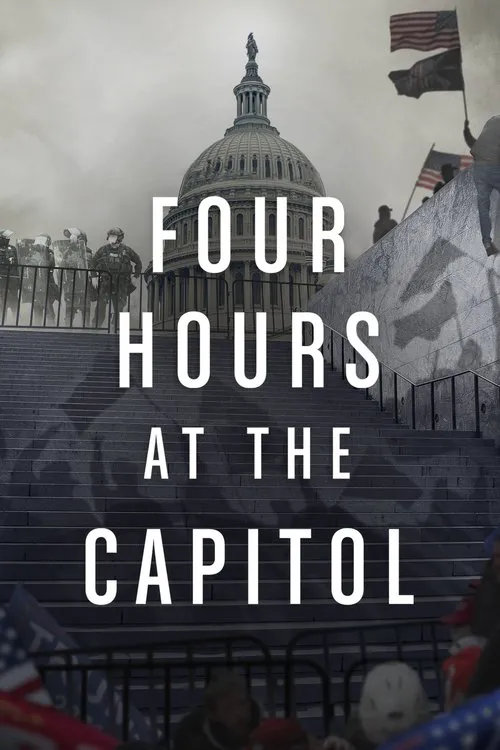Four Hours at the Capitol

Plot
Four Hours at the Capitol is a gripping documentary that delves into the extraordinary events of January 6, 2021, when the U.S. Capitol building was breached by a mob of Trump supporters intent on disrupting the certification of Joe Biden's presidency. The documentary offers a raw and unflinching look at the chaos that unfolded that day, weaving together interviews, footage, and real-time updates to create an immersive and captivating experience. The film begins with an overview of the months leading up to the insurrection, setting the stage for the gathering of thousands of Americans in Washington D.C. The protesters, many fueled by baseless claims of election fraud, had traveled from across the country to demonstrate their opposition to the 2020 presidential election results. As tensions rise and the mood becomes increasingly charged, the documentary masterfully captures the sense of foreboding and anxiety that gripped the nation. As the mob makes its way to the U.S. Capitol, the film's cinematic style shifts to a more frenetic and intense pace, mirroring the chaos unfolding on the ground. The footage is a mix of live streams, phone captures, and security camera recordings, which provides a unique and unfiltered perspective on the events of that day. The viewer is thrust into the midst of the action, experiencing the raw emotion and adrenaline-fueled frenzy of the mob as they overwhelm Capitol security and storm the building. The documentary also shines a light on the individual stories of those who were present that day, including security personnel, politicians, and even some of the protesters themselves. Their accounts offer a nuanced and complex perspective on the motivations and actions of the insurrectionists, highlighting both the deep-seated anger and resentment that drove them, as well as the more extreme ideologies and violent rhetoric that had taken hold. One of the most striking aspects of Four Hours at the Capitol is its willingness to confront the darker aspects of American politics and society. The film tackles the deep societal and economic divisions that contributed to the insurrection, as well as the role of social media in spreading misinformation and mobilizing extremist groups. It also raises important questions about the responsibilities of leaders, the role of the media, and the consequences of complacency in the face of rising extremism. As the documentary hurtles towards its climax, the viewer is confronted with the full horror of the insurrection. The footage of police officers beaten and bloodied, the screams of terrified civilians, and the destruction of property are all powerful reminders of the devastating consequences of that day's events. Throughout the film, the documentary's tone walks a fine line between objectivity and emotional engagement. The filmmakers eschew sensationalism, instead opting for a measured and thoughtful approach that respects the complexity of the events. At the same time, they never shy away from the raw emotion and outrage that defines the insurrection, creating a sense of urgency and importance that propels the viewer through the film. Ultimately, Four Hours at the Capitol is a searing indictment of the January 6 insurrection, but it is also a deeply human and empathetic exploration of the factors that led to that moment. By confronting the darkest aspects of American society and politics, the film invites us to reflect on the state of our democracy and our responsibility to uphold the values of democracy. As the insurrectionists are finally cleared from the Capitol, the documentary lingers on the aftermath, revealing the lingering sense of trauma and shock that continued to ripple through the nation. In the end, Four Hours at the Capitol offers a powerful testament to the resilience and strength of democracy, even in the face of unimaginable turmoil and chaos.
Reviews
Recommendations




